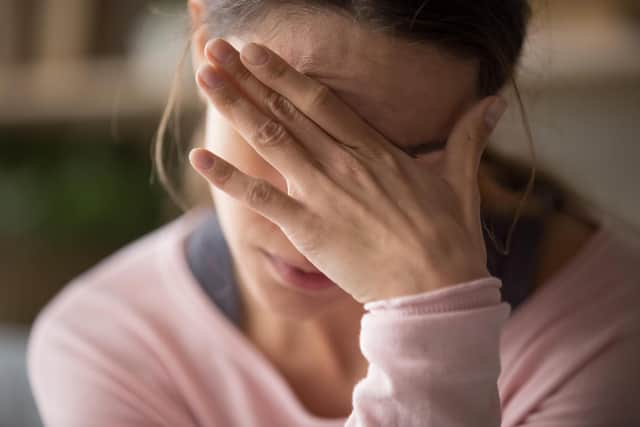What you can do to manage heightened levels of anxiety - Public Health Agency (PHA) advice
and live on Freeview channel 276
This is Mental Health Awareness Week (until May 21) and the Public Health Agency (PHA) is highlighting what we can do when experiencing anxiety.
Everyone can feel anxious from time to time, and it is normal to feel anxiety in certain everyday situations, for example if preparing for a job interview or at exam time.
This anxiety can help improve our performance.


Advertisement
Hide AdAdvertisement
Hide AdHowever, for some people, anxiety can begin to interfere with daily life and becomes intense and overwhelming.
Fiona Teague, mental health and emotional wellbeing lead at the PHA, said: “We can experience different types of anxiety with the daily challenges we face and now with the added impact of the cost-of-living crisis, people may be feeling an additional affect on their mental health and wellbeing.
“It is important to recognise that when you are anxious, there are self-help strategies to help you cope with these feelings.
"However, if you find your anxiety is having a significant impact on your daily life, remember that help and support is available to you – don’t hide problems away.
Advertisement
Hide AdAdvertisement
Hide Ad"It’s also important for all of us all to understand the signs that someone may be experiencing anxiety.”
Anxiety affects people in different ways, and prominent symptoms may include: feeling worried, restless or agitated; avoiding people or situations; increased use of alcohol or drugs; palpitations – a rapid and strong heartbeat; increased muscle tension; ‘jelly legs’; tingling in the hands and feet; hyperventilation; dizziness; difficulty breathing; wanting to use the toilet more often; feeling sick; experiencing a tight feeling across the chest area; and suffering from tension headaches.
Each person is likely to be affected differently.
Self-help strategies
There are steps you can take to develop ways of coping with the symptoms of anxiety.
These include the following, or others you may develop yourself:
Advertisement
Hide AdAdvertisement
Hide Ad-look at what helps you to relax, eg, reading, yoga or listening to music
-be more active – go outside for a walk or jog
-talk to your friends and family – talking really helps
-accept your feelings – ‘it will pass like before’; ‘this is just anxiety’
-avoid alcohol or limit your intake
-try to get adequate rest with good sleep
-reduce your caffeine intake
Fiona continued: “When anxiety starts to severely impact everyday life it can be debilitating and an indication of the development of an anxiety disorder.
"The most important thing you can do, if you feel like anxiety is taking over, is to talk about it. If the self-help strategies aren’t working for you, speak to your GP."
Advertisement
Hide AdAdvertisement
Hide AdThe Lifeline telephone crisis helpline service is also available and its experienced trained crisis counsellors are there to help those with high levels of anxiety, those needing support with feelings of low mood and depression, and people experiencing thoughts of suicide.
The service is free and available 24 hours a day. Call Lifeline on 0808 808 8000.
If you want to find out more about anxiety, self-help and support services available to you, visit www.mindingyourhead.info.